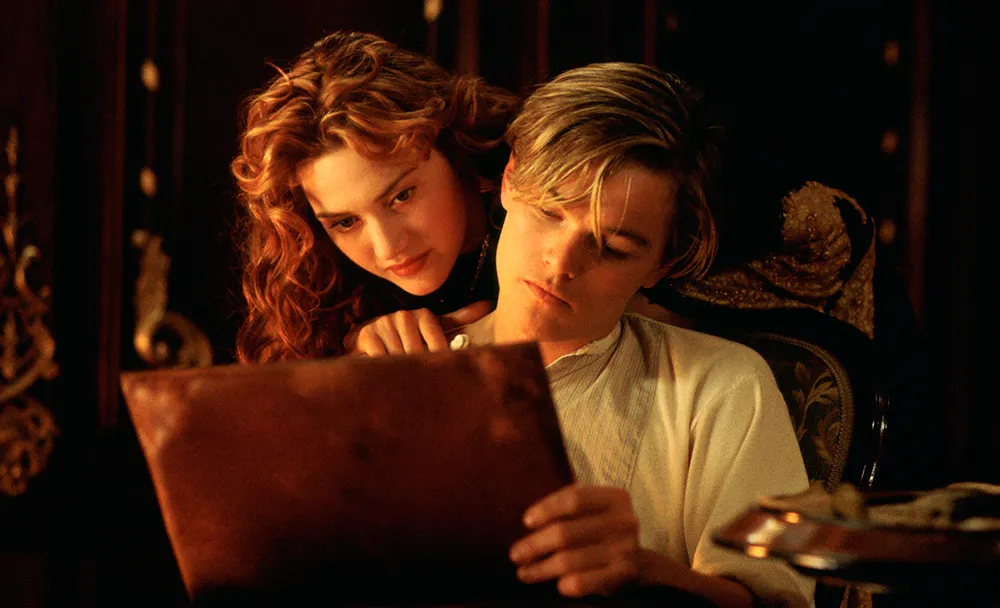zoomacademia.com– Released in 1997, Titanic remains one of the most iconic and celebrated films in cinematic history. Directed by James Cameron, the film masterfully blends historical drama, romance, and adventure, capturing the tragic sinking of the RMS Titanic in 1912. With its breathtaking visuals, unforgettable performances, and universal themes of love, loss, and survival, Titanic has transcended time, establishing itself as both a box office juggernaut and a cultural touchstone.
The Plot: A Tale of Love and Tragedy
Set against the backdrop of the Titanic’s ill-fated maiden voyage, the film tells the love story of Jack Dawson (Leonardo DiCaprio), a penniless artist, and Rose DeWitt Bukater (Kate Winslet), a young aristocratic woman trapped in a suffocating engagement. They meet on board the luxurious ship, and despite their different social backgrounds, a deep connection blossoms between them.
As their romance unfolds, the film simultaneously builds tension toward the ship’s inevitable collision with the iceberg. The final hours of the Titanic’s sinking serve as a heart-wrenching conclusion to both the historical event and the characters’ love story, leaving a lasting emotional impact on the audience.
Visual and Technical Mastery
One of the key elements that set Titanic apart as a cinematic masterpiece is its visual grandeur. James Cameron, known for his groundbreaking work in special effects, created a meticulously detailed recreation of the RMS Titanic. The film’s production team went to great lengths to design historically accurate sets, from the ship’s opulent first-class interiors to the chaotic scenes on deck as the ship sank.
The blend of practical effects and computer-generated imagery (CGI) was revolutionary for its time. The sinking sequence, which includes the ship breaking in half and its eventual descent into the Atlantic, is still hailed as one of the most spectacular and harrowing scenes ever filmed. Cameron’s use of technology, including underwater footage of the actual Titanic wreck, lent an eerie authenticity to the film.
Epic Performances and Chemistry
Leonardo DiCaprio and Kate Winslet’s performances are integral to the film’s success. As Jack and Rose, they bring youthful exuberance and vulnerability to their characters. DiCaprio’s portrayal of the charming and free-spirited Jack contrasts beautifully with Winslet’s portrayal of Rose, who is torn between duty and desire. Their chemistry was so electric that it became the subject of widespread media attention, and their romance quickly became one of the most beloved in film history.
Supporting actors like Billy Zane (who played Rose’s wealthy but cruel fiancé, Cal Hockley), Kathy Bates (as the unsinkable Molly Brown), and Frances Fisher (as Rose’s controlling mother) added depth to the film’s social commentary on class differences and human resilience in the face of catastrophe.
James Horner’s Iconic Score
No discussion of Titanic would be complete without mentioning James Horner’s legendary musical score. Horner’s music, particularly the hauntingly beautiful theme song “My Heart Will Go On,” sung by Celine Dion, became synonymous with the film’s emotional core. The score masterfully enhances the film’s sweeping romantic and tragic elements, elevating it from a historical drama to a deeply affecting emotional experience.
“My Heart Will Go On” became an international hit and won an Academy Award for Best Original Song, cementing its place in pop culture. The song’s soaring melody and poignant lyrics became the anthem for a generation of Titanic fans.
Themes of Class, Fate, and Survival
At its heart, Titanic is more than just a love story. The film delves deeply into themes of class disparity and the human struggle for survival. The rigid social structure aboard the ship reflects the inequalities of the early 20th century. Jack and Rose’s relationship symbolizes the breaking down of those social barriers, albeit briefly, before the Titanic’s sinking reasserts the harsh realities of class privilege and sacrifice.
The story also explores the idea of fate. While the Titanic was touted as “unsinkable,” its tragic fate serves as a metaphor for human hubris and the unpredictability of life. The passengers on board—rich and poor, young and old—are faced with the same, equalizing force of nature during the disaster. This universality of mortality gives the film a powerful sense of inevitability and poignancy.
Cultural and Box Office Legacy
Upon its release, Titanic became a worldwide phenomenon. It was the first film to surpass $1 billion at the global box office, holding the record as the highest-grossing film for over a decade until James Cameron’s Avatar (2009) claimed the top spot. The film’s appeal transcended age, gender, and nationality, resonating with audiences across the globe.
TItanic also made history at the 1998 Academy Awards, winning 11 Oscars, including Best Picture and Best Director for Cameron. This tied it with Ben-Hur (1959) for the most Academy Awards won by a single film, a record only matched again by The Lord of the Rings: The Return of the King (2003). The film’s sweeping victories were a testament to its technical, artistic, and emotional achievements.
Enduring Popularity and Influence
More than two decades later, Titanic continues to be a cultural touchstone. The film has been re-released in various formats, including 3D, and remains a favorite among moviegoers and critics alike. Its iconic lines—such as “I’m the king of the world!” and “I’ll never let go”—have become part of cinematic history.
Beyond its cinematic achievements, Titanic also sparked a renewed interest in the historical event. Documentaries, books, and exhibitions about the Titanic disaster experienced a surge in popularity after the film’s release, further embedding the ship’s story into the collective consciousness.
Conclusion
Titanic is much more than a film; it is an extraordinary piece of cinematic art that has left an indelible mark on both the film industry and popular culture. Its powerful storytelling, groundbreaking visual effects, unforgettable performances, and emotional depth make it a timeless masterpiece. Even today, its themes of love, sacrifice, and the fragility of life continue to resonate with audiences around the world, securing its place as one of the greatest films ever made.
The legacy of Titanic is not just in its box office success or its numerous awards, but in its ability to move and inspire generations of viewers, reminding us of the enduring power of cinema to tell stories that touch the heart.










